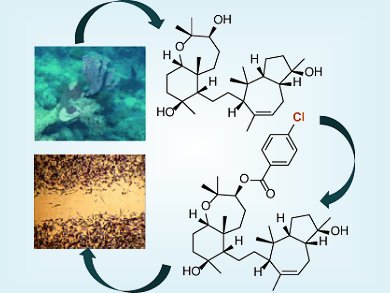Marine natural products are among the most important sources for anticancer drug discovery. The marine-sponge-derived triterpene sipholenols (pictured, top) can inhibit the migration and invasion of breast cancer cells, impeding their expected metastasis. Several sipholenol derivatives were prepared with the aim of improving their activity. Breast tumor kinase (Brk), also known as protein tyrosine kinase 6 (PTK6), was identified as a potential molecular target of sipholenols. Overexpressed Brk acts as a mediator of cancer cell phenotypes, inducing their proliferation, survival, and migration. Inhibition of Brk is a new approach toward sensitizing tumor cells to other chemotherapeutics and controlling the metastasis of breast cancer.
A collaborative research effort led by Khalid A. El Sayed and colleagues, University of Louisiana, Monroe, USA, has revealed sipholenol analogues as novel scaffolds for drugs that inhibit breast cancer cell migration and invasion. By using a combination of high-throughput screening, spectroscopic analysis, and subsequent modification of initial hits, the team was able to generate a series of active entities. Their results show the potential of these compounds to act as potent and selective inhibitors of Brk activity, with the potential for use in controlling Brk-dependent metastatic malignancies.
- Optimization of Marine Triterpene Sipholenols as Inhibitors of Breast Cancer Migration and Invasion,
A. I. Foudah, S. Jain, B. Busnena, K. A. El Sayed,
ChemMedChem 2013, 8(04).
DOI: 10.1002/cmdc.201200516



